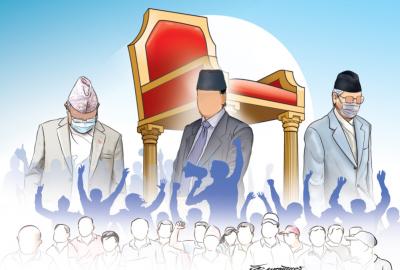Memory of Peasants' Movement
2021-10-07SRADDA THAPA
It’s not everyday that an engineer turns to historical writing, and that too with the ease and grace presented by Yogesh Raj. His History as Mindscapes: A Memory of the Peasant’s Movement of Nepal has a peasant speak for himself, and not be spoken for, as has been the norm.
Of course, the peasant that Raj decides to hold the microphone up for, is no unsung hero. Krishna Bhakta Caguthi’s name may be less heard today, but for anyone who has taken an interest in land issues, peasant movements or the city of Bhaktapur, Caguthi’s name will ring loud and true.
Raj does not appear to instill hope in the reader, as much as to be inspired by the struggle, wisdom and determination of an illiterate, underprivileged “haliko chhora.” When even the leaders of Communist revolutions are the offspring of yesteryear’s elite and powerful, Caguthi stands as one of the few.
History as Mindscapes is neatly divided into three sections, and if there is something to appreciate in a hard-science-turned-soft-science writer, it is the organization, precision and meticulous nature in which the former shapes the product of the latter.
As the first section delves into the philosophy and methodology of the book, non-specialists may be tempted to put the book down for its theory-laden and technical reference. And yet, no sooner will you have turned the pages to the second and main section of the book, “Caguthi Speaks”, that you will see how inviting it is to listen to the Baje. The third and final section is complete with quaint appendices – photocopies of bills, notes, minutes, and official documents.
Printed on quality paper and travel-size friendly format, the margins are left wide enough for the reader to jot their thoughts. The diacritics may frustrate most non-anthropologists for whom “Krsnabhakta” takes a few more milliseconds to register before reading it as “Krishna Bhakta.” Hence, the parts where Raj has his intuitions to decide how best to translate Caguthi’s spoken words into written text are welcomed, it helps the reader glide by the stories and the arguments.
Additionally, instead of the traditional footnotes, Raj drops what I would call “hip-notes” as they are attached to the margins. For readers who would prefer to hit mute on this “parallel discourse” that feels like a running commentary on a DVD, Raj is only offering background information, historical contexts, references and explanation to assist the reader further reveal Caguthi to them. The fact that this is on the side and not edited into the main text is to be appreciated.
Caguthi begins his story in the aftermath of the devastating 1934 earthquake that ravaged his city, Bhaktapur. He goes on to describe how peasants have always been pulled on all sides by political parties to serve their own interests and not that of the peasants. It is refreshing to read an account of history and the side of a story most often repressed by those who traditionally hold the pen – the rich, the powerful, and the elite. Caguthi’s humble roots and political career are not a story of rags to riches, but of an honest man who simply sought to alleviate the pains of his people, not only for them but as one of them.
Hardly seeking personal glory in financial remuneration, Caguthi finds himself propelled to politics. He appears strong, not powerful, when he attempts to expose the misdeeds of landowners. As an illiterate tiller, Caguthi recounts his brave attempts to disclose how landowners use unfair scales to measure their due, their unwillingness to abide by the land reform policies, and of constantly seeking to profit where an even exchange ought to prevail.
Though in retrospect, Caguthi Baje sounds exhausted and disappointed, Raj has offered an opportunity for Caguthi to analyze and the reader to be privy to his analysis.
Caguthi describes his political career: Awkward visits with national-level politicians who in comparison to him lived decadent lives, frustrating attempts at character assassination, and the humiliation he faced when physically assaulted and dragged around the city, half naked and bleeding.
Caguthi’s life was full of sacrifices, and though some may say history defeated him, others may argue on the contrary. He did, after all, prove instrumental in shaping official acts and defying the oversimplified “land to the tillers” mantra of every political party across the spectrum.
These final words are of Caguthi, self-reflecting his decision to collaborate with Raj:
“What big change will it bring if you write this book?...But someone may get tired of listening to the same lies again and again, and may become interested in other version of the truth. He may venture into the dusty corners of places and, if I tell you the things and if you write them down in a book, he may find it, won’t he?”
We have found it, Caguthi Baje. We are now only waiting for one who dares to stand on your shoulders.
Source: Republica15March2011










